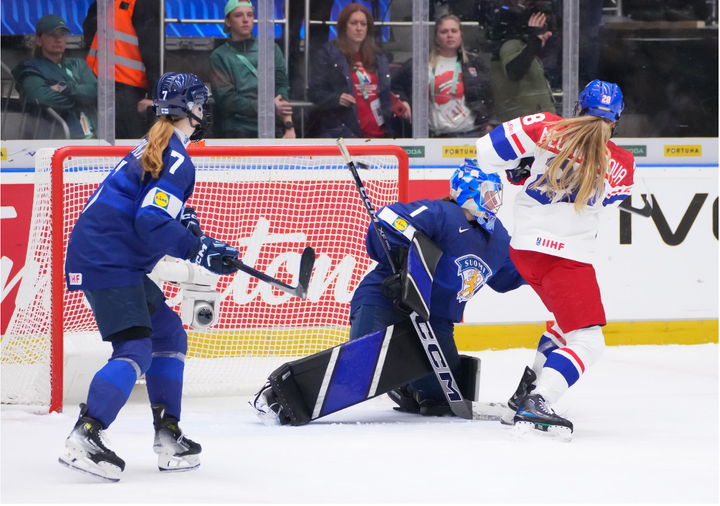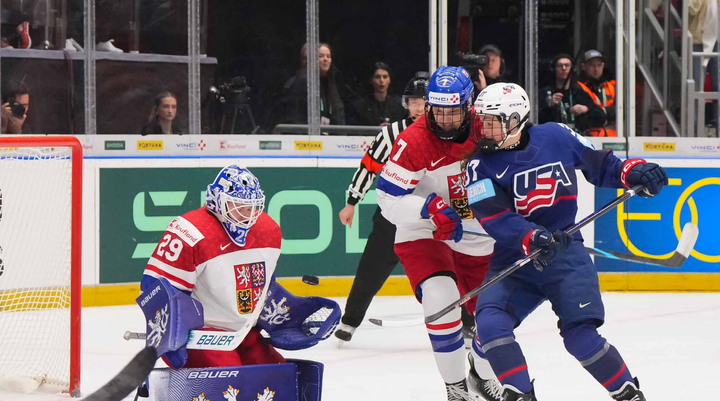2022 Olympics Recap: Team USA
A look back at the team’s silver medal run
Let’s get something really important out of the way here: the US coaching staff made some incredibly strange decisions throughout the 2022 Olympics. Obviously, the coaches aren’t on the ice, but when examining the team’s overall performance one can’t help but look at those choices as a major contributing factor to Team USA finishing second.
Let’s take a look at how Team USA’s silver medal run played out.
How the US finished
They finished second in the preliminary round and second overall, coming home from Beijing with a silver medal.
What went wrong
Bench management - The IIHF provides time on ice data and thus, a peek into the coaches’ decisions and how they deploy their skaters. How head coach Joel Johnson managed the ice time of defenders is of particular interest.
Veteran defender Megan Keller had 176 minutes on the ice. To put that another way, she was on the ice for nearly 42 percent of the total time the US played in the Olympics. That’s an average of 25 minutes a game, with the gold medal game clocking in at 29:17. The next highest on the team were also defenders — Cayla Barnes had 166 total minutes on the ice (39.5%), first-time Olympian Savannah Harmon played 161 minutes (38%), and Lee Stecklein had 160 minutes (38%).
Given those numbers, you’d think the US only had four defenders available. But they didn’t, they had seven. Megan Bozek played 88 minutes, nearly half as much as the top four, and Jincy Dunne and Caroline Harvey played 40 minutes and 23 minutes respectively.
No, they never got hurt and yes, they dressed for all seven games. According to the IIHF, Dunne didn’t touch the ice in the final three games, and Harvey took three short shifts in those games.
All of this begs the question: why? Why have Dunne and Harvey ride the bench when they could be the future of the US blue line, which has seen a lot of change since 2018 due to retirements.
Dunne had a fantastic career at Ohio State where she had 99 points in her 162 games as a Buckeye. She is a relative newcomer to the senior national team program after being a mainstay on the U18 team. But she got little to no experience at the 2022 Games despite making a real impact in her limited rdole. If Johnson doesn’t think she’s it, why bring her along?
With Harvey, maybe it makes a little more sense. She’s 18, one of the youngest on the team, and hasn’t even played NCAA hockey yet. Maybe they’re thinking, okay we’ll bring her along for the experience of it so she’s ready for the future. But why?
It’s not that the top four defenders were playing poorly — though they did have some well-documented defensive breakdowns that lead to goals — it's just that it was clear, especially in the gold medal game, they were overworked and tired. This is a lot of intense hockey in a short amount of time. That will wear down even the most highly tuned and prepared athletes. The team also needed a spark, a push, something in the gold medal game against Canada, and fresh legs could have been that spark.
This doesn’t even touch on the deployment of forwards which wasn’t quite as skewed, save for the gold medal game with Johnson continued to lean too much on the top line out despite the other forwards having strong tournaments thus far.
Then there’s the goaltending decisions. According to Wall Street Journal’s Laine Higgins, Alex Cavallini told reporters she tore her MCL in early January and had only returned to full practice three days after arriving in Beijing. Cavallini went on to play all three knockout round games (the quarterfinals, the semifinals, and the gold medal game).
This was after Johnson rotated the goaltenders in the preliminary games, with Nicole Hensley and Maddie Rooney each getting a game and Rooney playing the US v Canada preliminary game.
Why go with a goaltender who was injured — though, to Cavallini’s credit she never seemed injured in her play — when two other highly skilled and capable goaltenders are right there. Both Hensley and Rooney have experience at this level from 2018. So why put an injured goaltender out? Sure there’s the “hot hand” argument, but leading into the quarterfinals, Hensley and Cavallini had the exact same stat line from their single preliminary round game.
The next moves USA Hockey makes will be extremely telling. Johnson stepped in quickly from an assistant in mid-April 2021 after Bob Corkum left the program before camp opened ahead of the first attempt at the 2021 World Championships. That tournament was later canceled, then postponed to August. Of course, Canada won gold at the 2021 Worlds for the first time since 2012. Does USA Hockey replace Johnson ahead of August’s planned World Championships or keep him on to see if he can course correct?
Special teams - The power play for the US was a big ol’ yikes. They had a skater advantage 29 times during the tournament — the second-highest amount of opportunities of any team. Yet they only scored seven power-play goals. That’s about 24 percent of the time and that number is buoyed by the power-play improving later in the tournament.
To put that into perspective, the two teams with a better power play conversion rate had four and five less power-play chances. Not converting on the power play really hurt the US, especially in the gold medal game where they went 1 for 3, with the goal coming in the final 12.3 seconds when they also had Cavallini pulled for the extra skater (aka a 6-on-4).
Their penalty kill wasn’t much better either. They were one of the least penalized teams in the tournament with only 15 penalties called on them, but they gave up three goals, for a 80% kill rate. Again, for comparison, Canada had 34 penalties called against them but only let in 5 goals. That’s just not sharp enough for Team USA. Not in the Olympics.
Special teams, amiright?
What went right
They played well despite it all - When you have players playing nearly 40% of the game for multiple games, things are going to fall apart. And they did, at times. But also the US was never truly actually “out” of any games, even the gold medal game when they were down 3-1 in the third period. Could some better bench management have helped them make a full comeback? Probably, but their top lines and defensive pairings held strong despite Johnson’s tactics.
They could have absolutely fallen apart after Brianna Decker got injured in the first game of the tournament and was out for the rest of the Games. But they were able to bounce back and shift the lines. Abby Roque slotted in well at center, winning nearly 60% of her faceoffs. They had a well-rounded attack for the rest of the preliminary round as well. First-time Olympian Jesse Compher tied for second on the team in goals with three, and every player but Harvey (and Decker) hit the score sheet.
They outshot teams every game, putting 374 shots on net over the seven games. They only found the back of the net 30 times, which pales in comparison to the production that Canada was able to manage. Comparing the two superpowers to each other is inescapable and there’s no doubt that Canada was the more dangerous team at both even strength and on the power play.
All in all, there was a lot to like on the ice.
Top 3 players
Savannah Harmon, defender - In addition to racking up huge minutes, Harmon led all US defenders in points and was tied for second-most points by a defender with 7. She wasn’t called for a penalty all tournament and had an impressive +7. The Clarkson University graduate and Buffalo Beauts and PWHPA alum is extremely new to the National Team program, only being in the pipeline really since 2019. She clearly made a name for herself in these games, and I’d look for her to be a mainstay on their blueline.
Alex Cavallini, goaltender - Playing with a torn MCL is not great nor advisable. We’ll never know how that truly came to be but Cavallini, looked solid in net. She led the tournament in goals against average with 1.27 and is the only goaltender to not give up a power-play goal.
Hilary Knight, forward - It's Hilary Knight, come on. The four-time Olympian led the team in goals with 6 and points with 10. She scored the tying goal in the semifinal game when Czechia seemed to have the US on its heels and had a shorthanded goal in the gold medal game that gave some life to the team when they were down 3-0. Knight is a veteran presence who stepped up when her team needed her time and time again this tournament.





Comments ()